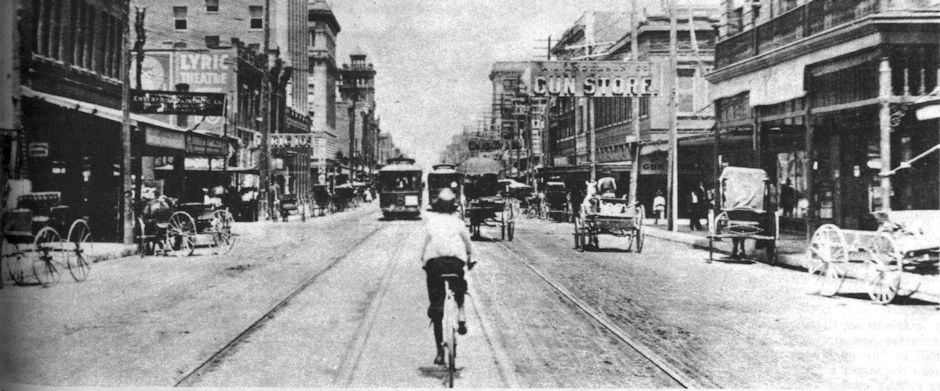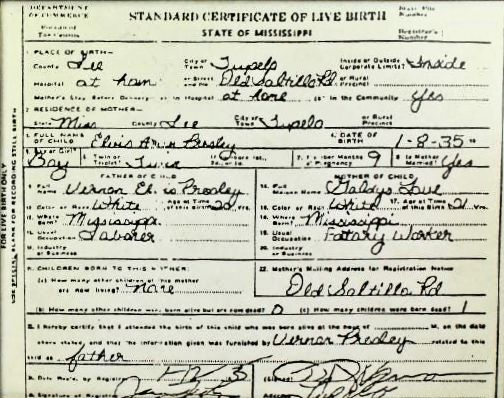 In a two-room shotgun house in Tupelo, Mississippi on January 8, 1935 Gladys Smith Presley gave birth to a five-pound bouncing baby superstar.
In a two-room shotgun house in Tupelo, Mississippi on January 8, 1935 Gladys Smith Presley gave birth to a five-pound bouncing baby superstar.
By age six Elvis was singing at family gatherings. Four years later at a fair in Tupelo he had to stand on a chair to reach the microphone, but his rendition of the song “Old Shep” won fifth place in a talent show.
At age twelve Elvis began learning to play a guitar that his mother bought for him at a hardware store.
After graduation from high school in 1953 he made an acetate recording at Memphis Recording Service, home of Sam Phillips’s Sun Records. Presley sang “My Happiness” and “That’s When Your Heartaches Begin.” The recording was a birthday present for his mother.
Sam Phillips liked what he heard in 1953 and a year later recorded Elvis’s first single for Sun Records: a white cover of Arthur “Big Boy” Crudup’s “That’s All Right” backed by “Blue Moon of Kentucky.”
Elvis worked days as a delivery driver for Crown Electric Company in Memphis as he and his band (Scotty Moore and Bill Black) continued to record and began to perform in clubs across the South.
On the strength of his Sun records Elvis in October 1954 made his first—and only—appearance on the Grand Ole Opry radio program. He was not a grand ole success. His rockabilly style was not well received by the traditionalist Opry audience. The show’s talent manager, Jim Denny, reportedly suggested that Elvis not give up his day job.
So, Elvis gave up his day job.
He would concentrate on music night and day.
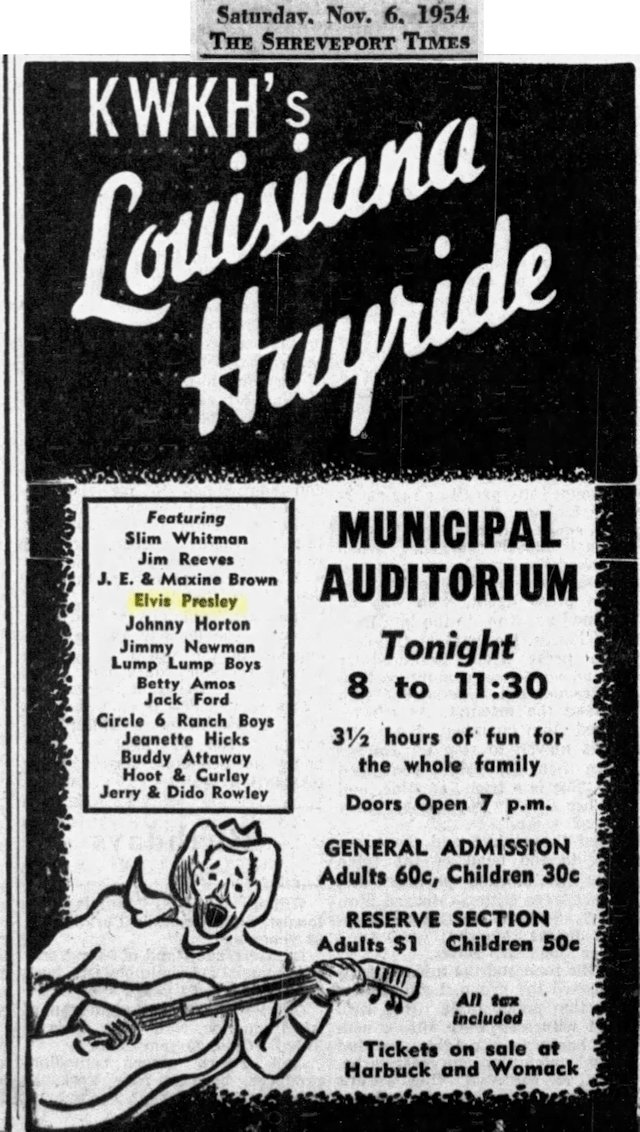 Sure enough, two weeks after his Opry appearance Elvis made his first appearance on the Louisiana Hayride weekly country music radio program from Shreveport. Elvis was well received by the more progressive audience of the Hayride. He signed a one-year contract. The Hayride would be a major megaphone for Elvis: The program was carried by 190 radio stations in thirteen states.
Sure enough, two weeks after his Opry appearance Elvis made his first appearance on the Louisiana Hayride weekly country music radio program from Shreveport. Elvis was well received by the more progressive audience of the Hayride. He signed a one-year contract. The Hayride would be a major megaphone for Elvis: The program was carried by 190 radio stations in thirteen states.
Note other names on the Hayride bill: Jimmy Newman, Jim Reeves, Slim Whitman, Johnny Horton.
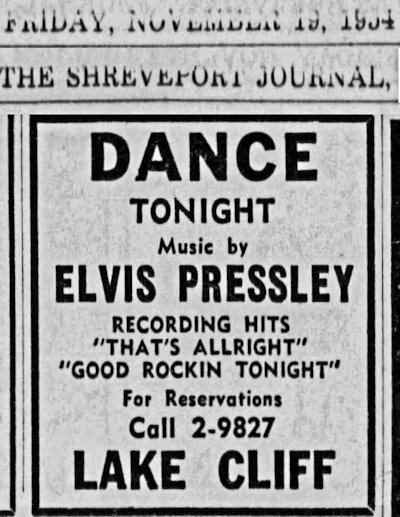
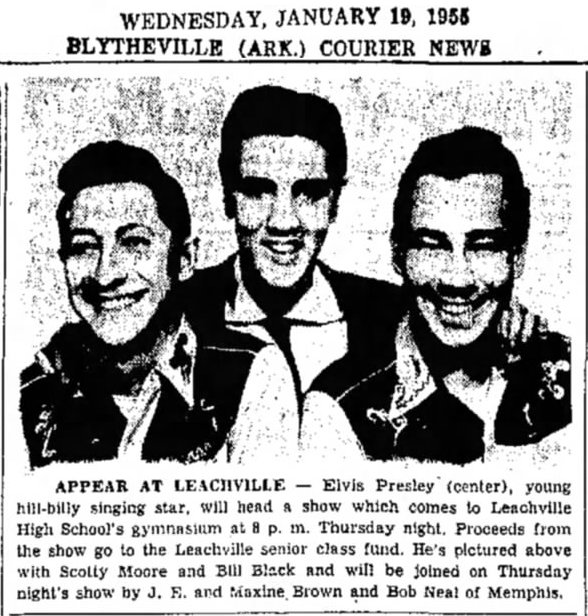 Meanwhile Elvis played clubs—and the occasional high school gym—between his Saturday night appearances on the Hayride.
Meanwhile Elvis played clubs—and the occasional high school gym—between his Saturday night appearances on the Hayride.

In May 1955 Elvis and his pelvis, then both twenty years old, came to Cowtown for the first time as part of a Grand Ole Opry tour. He was the top-billed performer at the North Side Coliseum.
 Three weeks later he was back in town with the All-Star Country Road Show, a country-western music program broadcast on WBAP radio.
Three weeks later he was back in town with the All-Star Country Road Show, a country-western music program broadcast on WBAP radio.
The Star-Telegram provided no news coverage of Elvis’s first and second Fort Worth appearances—an indifference that would not be repeated.
Soon after the Fort Worth appearances came another important event in the career of Elvis Presley: Colonel Tom Parker, who had managed country singer Hank Snow and others, became Elvis’s manager. Under Parker’s savvy management, soon Elvis would no longer being recording for a small label, playing high school gyms, and being broadcast only on the small medium of radio.
For starters, in November Parker moved Elvis from Sun Records to RCA Victor.
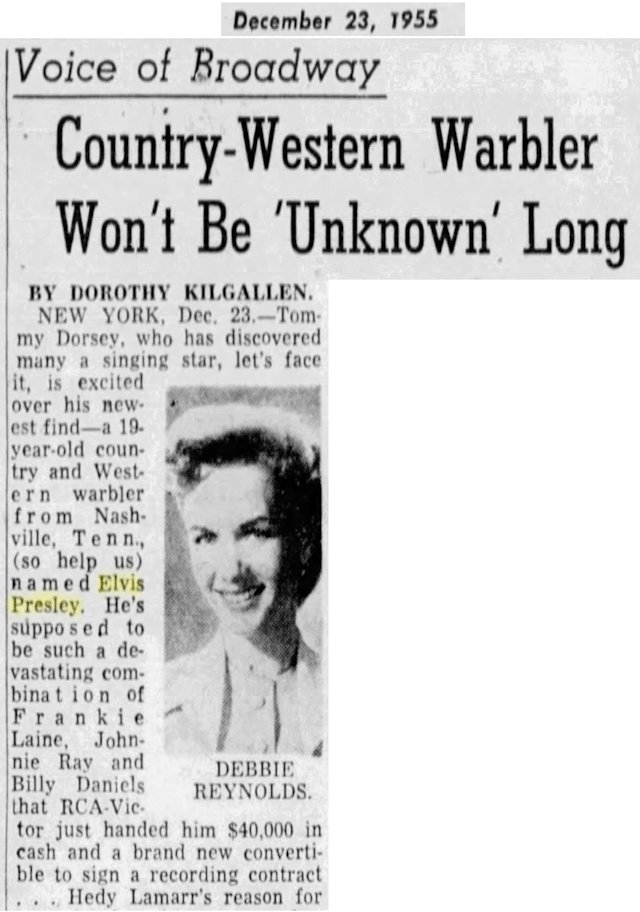 In December syndicated New York entertainment columnist Dorothy Kilgallen announced that big band leader Tommy Dorsey had discovered “a 19-year-old country and Western warbler from Nashville, Tenn., (so help us) named Elvis Presley.”
In December syndicated New York entertainment columnist Dorothy Kilgallen announced that big band leader Tommy Dorsey had discovered “a 19-year-old country and Western warbler from Nashville, Tenn., (so help us) named Elvis Presley.”
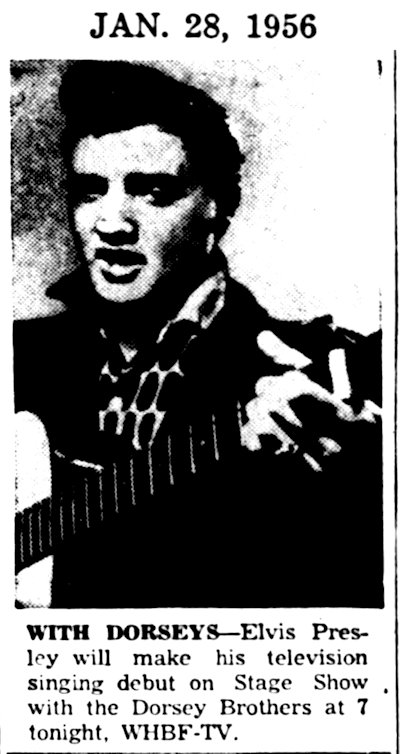 Under the management of Parker, Presley broke out in 1956. On January 27 his first RCA Victor recording, “Heartbreak Hotel,” was released as a single. It would be a million-seller—the first of 171 gold records.
Under the management of Parker, Presley broke out in 1956. On January 27 his first RCA Victor recording, “Heartbreak Hotel,” was released as a single. It would be a million-seller—the first of 171 gold records.
The next day—eight months before his better-remembered first appearance on the Ed Sullivan Show—Elvis appeared on the Dorsey brothers’ Stage Show on CBS television.
Stage Show was an unlikely stage for the rising rockabilly star. Tommy and Jimmy Dorsey were known for their big band swing music. But the brothers wanted to increase the show’s ratings in the South.
When they heard about Elvis, they invited him to appear on the show. He sang a “Shake, Rattle, and Roll”/“Flip, Flop, and Fly” medley and “I Got a Woman.”
Author Peter J. Levinson in his 2005 biography of Tommy Dorsey wrote: “The sloe-eyed Presley had a leering smile, while his body gyrated with unabashed sexuality. A strong country blues sense emanated from the handsome young singer . . . whose forelock drooped over his face added to his allure.”
But as with the Grand Ole Opry, not everyone was impressed. The Dorsey band members did not know what to make of Presley. Some tried to hide their laughter.
Indeed, the television network received letters of indignation from viewers: How dare the big band Dorsey brothers present such a travesty!
But Elvis would appear on the show five more times over two months.
His star was rising.
And so were the show’s ratings.
 Eight days before Elvis’s debut on national television on the Dorsey Brothers Stage Show, he made his third appearance in Fort Worth, second-billed under Hank Snow at the North Side Coliseum. Presley had just turned twenty-one.
Eight days before Elvis’s debut on national television on the Dorsey Brothers Stage Show, he made his third appearance in Fort Worth, second-billed under Hank Snow at the North Side Coliseum. Presley had just turned twenty-one.
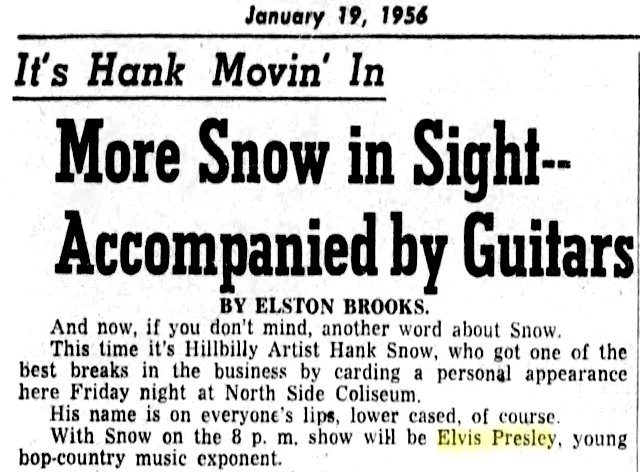 Note that Elston Brooks referred to Presley as a “bop-country music exponent.” The media struggled to pigeon-hole Presley’s music. Among other labels hung on his music were “blues,” “rock and roll,” “rockabilly,” “country and western,” “rhythm and be-bop,” and “half-bop, half-western.”
Note that Elston Brooks referred to Presley as a “bop-country music exponent.” The media struggled to pigeon-hole Presley’s music. Among other labels hung on his music were “blues,” “rock and roll,” “rockabilly,” “country and western,” “rhythm and be-bop,” and “half-bop, half-western.”
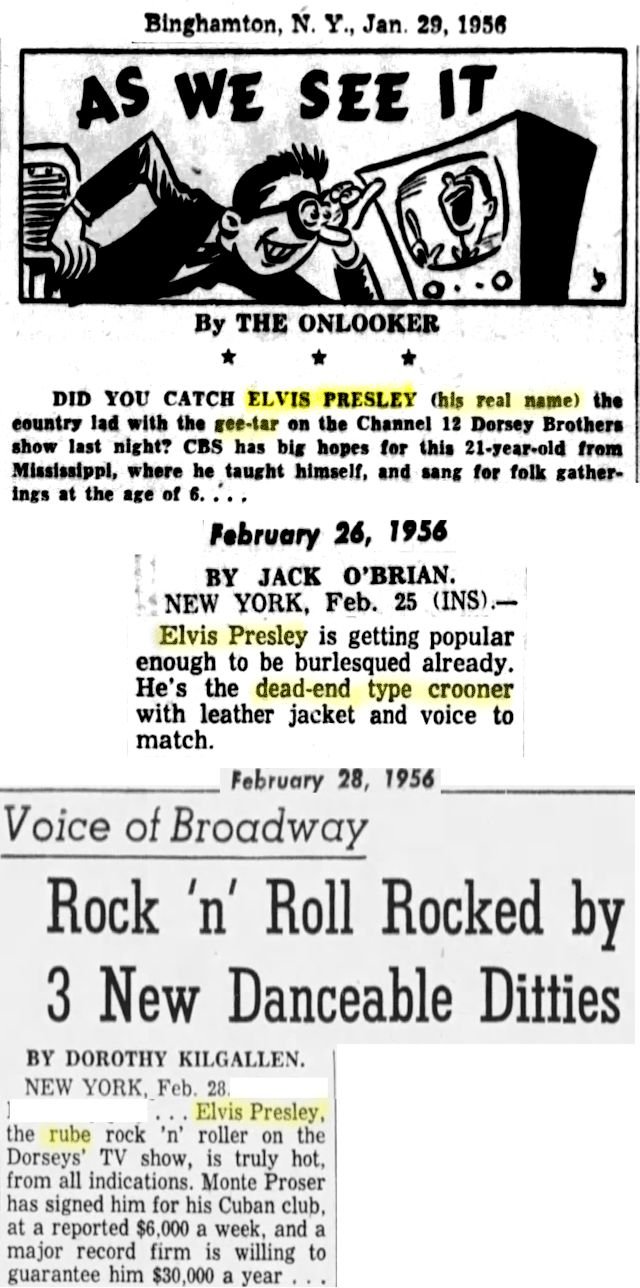 Syndicated columnists mocked Elvis even as they reported his rising popularity.
Syndicated columnists mocked Elvis even as they reported his rising popularity.
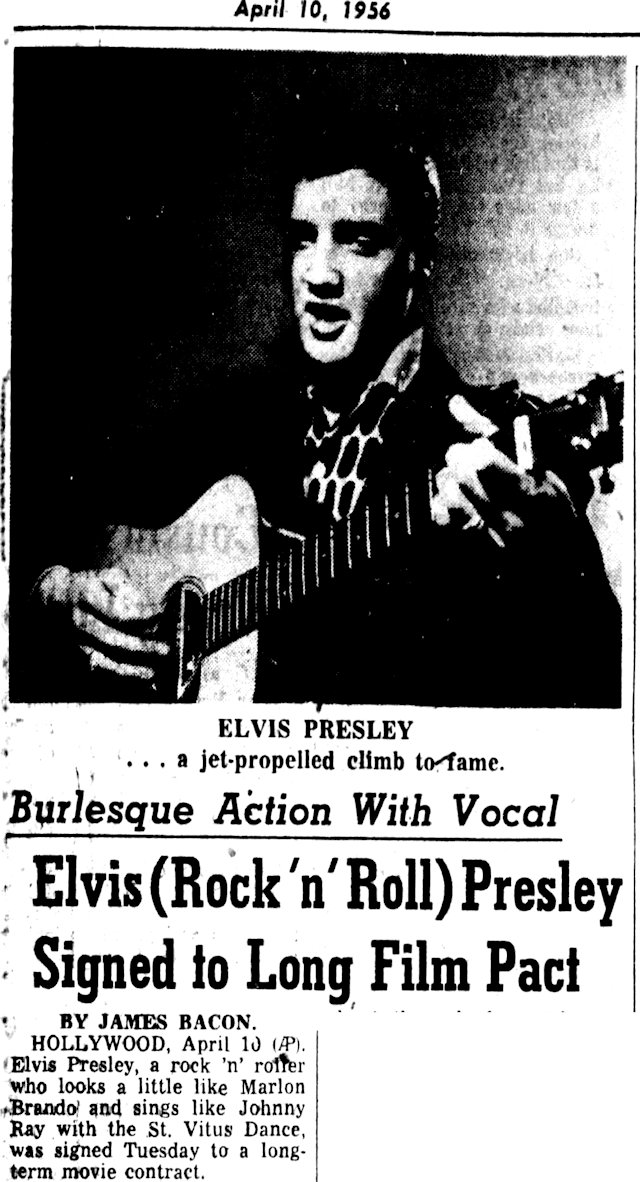 In April 1956 Paramount Studios saw ticket office gold in the “rube rock ’n’ roller” and signed the “dead-end type crooner” to a movie contract.
In April 1956 Paramount Studios saw ticket office gold in the “rube rock ’n’ roller” and signed the “dead-end type crooner” to a movie contract.
The Associated Press wrote: “Elvis Presley, a rock ’n’ roller who looks a little like Marlon Brando and sings like Johnny Ray with the St. Vitus Dance, was signed Tuesday to a long-term movie contract” with Paramount Studios.
“Presley, a 21-year-old Memphis blues singer with long sideburns and black denim trousers, is the current swooner among bobby-soxers.
“Hal Wallis Productions had screen tested Presley a few weeks ago after his RCA recording of ‘Heartbreak Hotel’ soared near the million copy mark.
“However, the producer didn’t sign Presley until he made three appearances in San Diego last week. The first was on the Milton Berle television show from the flight deck of the Navy carrier Hancock. The next two were in the San Diego arena where turnaway audiences of 5,000, mostly teenaged girls, paid $15,000 gross to hear him sing eight songs.
“Presley sings with sensual movements not unlike those of a burlesque queen. The effect on bobby-soxers is such that the arena manager had to call out police and a platoon of shore patrol to help quell the mob who pursued Presley to a barricaded dressing room.
“He also has been the subject of two acid takeoffs by television comics Steve Allen and Sid Caesar. This hasn’t hurt his jet-propelled climb to fame.
“Elvis plays a savage guitar as part of his act and averages about three broken strings a performance.
“Before he took up the ‘gee-tar,’ he was a $35-a-week truck driver in Memphis. His climb has been so rapid that only last week a midwestern newspaper called Paramount Studios to check a report that Presley had died. It seems that girls in the local high school were so upset by the rumor that they were not going to classes.”
 Also in April 1956 Elston Brooks announced that Elvis Presley—“the writhing guitar player”—would make his fourth appearance in Fort Worth.
Also in April 1956 Elston Brooks announced that Elvis Presley—“the writhing guitar player”—would make his fourth appearance in Fort Worth.
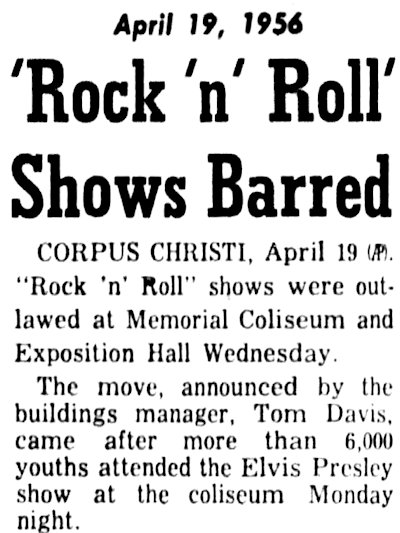 On the day before Elvis’s show in Fort Worth, the city of Corpus Christi “outlawed” “Rock ’n’ Roll” shows at the city’s Memorial Coliseum and Exposition Hall after more than six thousand teenagers attended the Elvis Presley show. City Buildings Manager Tom Davis said many parents and some teenagers called the show “vulgar.”
On the day before Elvis’s show in Fort Worth, the city of Corpus Christi “outlawed” “Rock ’n’ Roll” shows at the city’s Memorial Coliseum and Exposition Hall after more than six thousand teenagers attended the Elvis Presley show. City Buildings Manager Tom Davis said many parents and some teenagers called the show “vulgar.”
Davis said the show and others like it were contributing to juvenile delinquency.
And Variety, the show business trade journal, published a report on “Rock ’n’ Roll Dynamite” that called rock and roll “a phenomenon producing mass hysteria among youngsters.”
 By the time Elvis made his fourth appearance in Fort Worth, he was the “sensational RCA Victor artist” and “coast to coast television star.”
By the time Elvis made his fourth appearance in Fort Worth, he was the “sensational RCA Victor artist” and “coast to coast television star.”
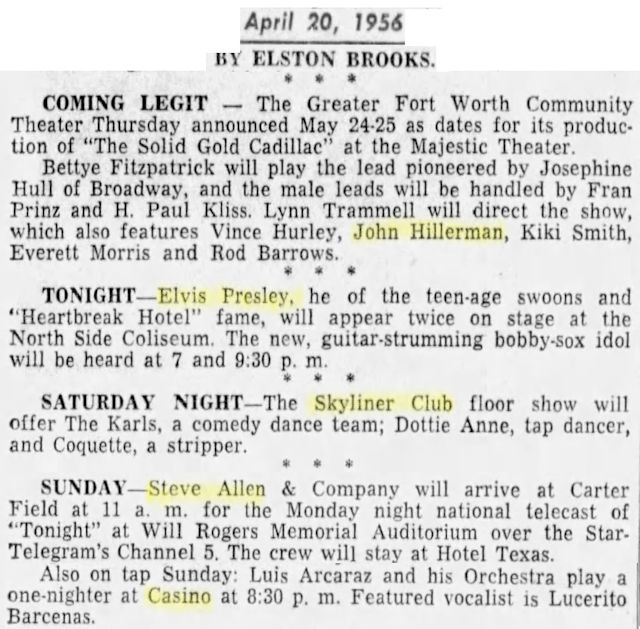 Elston’s column on April 20, 1956 was a real time capsule:
Elston’s column on April 20, 1956 was a real time capsule:
John Hillerman, who would later portray the sidekick on Magnum, P.I. (1980-1988), was a member of Greater Fort Worth Community Theater.
The cast and crew of Steve Allen’s Tonight show would fly into Amon Carter Airport to broadcast a live show from Will Rogers Memorial Auditorium.
Also mentioned were the Skyliner Club on Jacksboro Highway and Casino Park ballroom at Lake Worth.
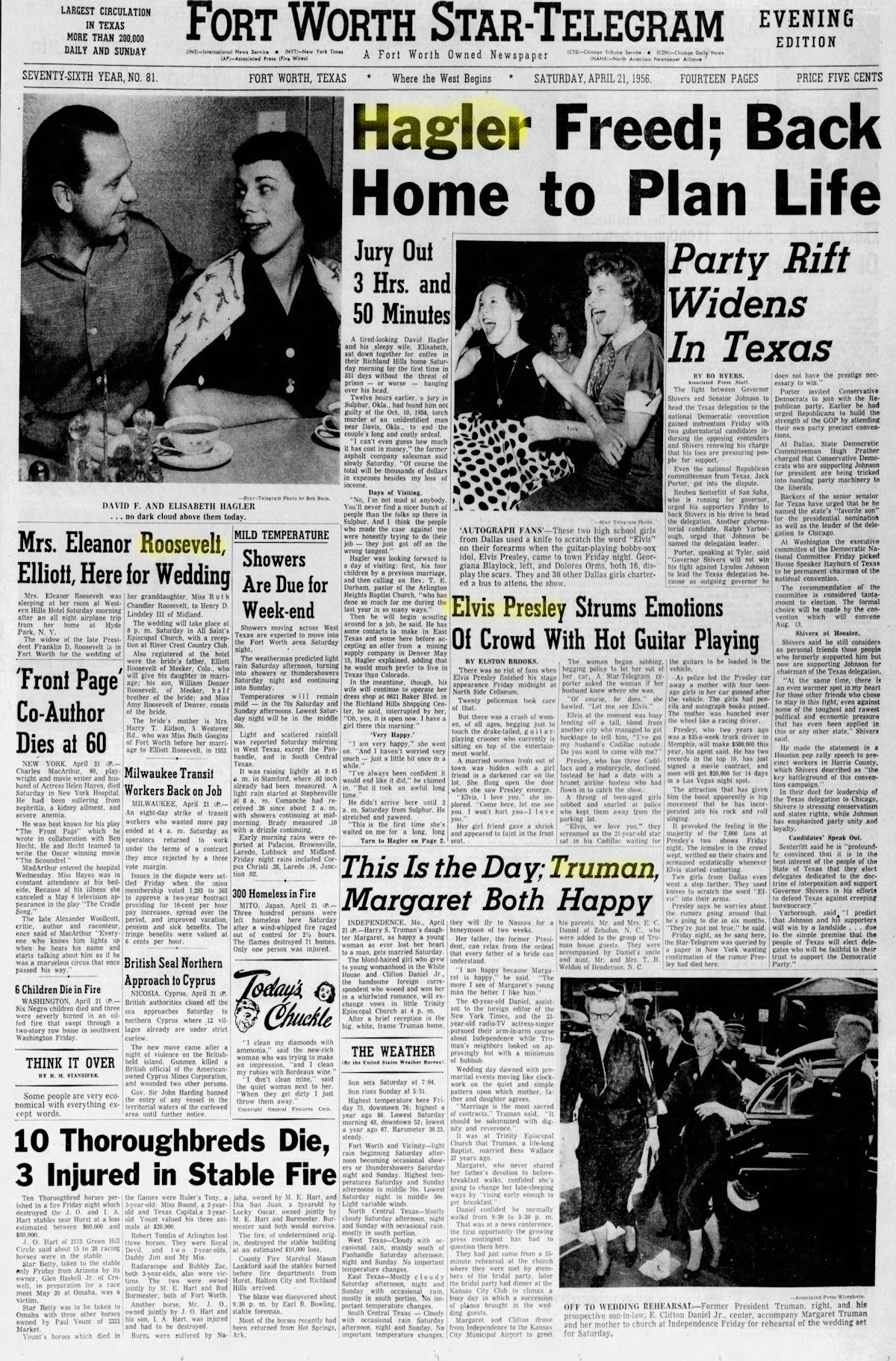 Elston Brooks wrote the page 1 story:
Elston Brooks wrote the page 1 story:
“There was no riot of fans when Elvis Presley finished his stage appearance Friday midnight at North Side Coliseum. Twenty policemen took care of that.
“But there was a crush of women, of all ages, begging just to touch the drake-tailed, guitar-playing crooner who currently is sitting on top of the entertainment world.
“A married woman from out of town was hidden with a girl friend in a darkened car on the lot. She flung open the door when she saw Presley emerge.
“‘Elvis, I love you,’ she implored. ‘Come here, let me see you. I won’t hurt you—I love you.’
“Her girl friend gave a shriek and appeared to faint in the front seat. The woman began sobbing, begging police to let her out of her car.
“A Star-Telegram reporter asked the woman if her husband knew where she was.
“‘Of course, he does,’ she bawled. ‘Let me see Elvis.’
“Elvis at the moment was busy fending off a tall blond from another city who managed to get backstage to tell him, ‘I’ve got my husband’s Cadillac outside. Do you want to come with me?’
“Presley, who has three Cadillacs and a motorcycle, declined. Instead he had a date with a brunet airline hostess who had flown in to catch the show.
“A throng of teen-aged girls sobbed and snarled at police who kept them away from the parking lot.
“‘Elvis, we love you,’ they screamed as the 21-year-old star sat in his Cadillac waiting for the guitars to be loaded in the vehicle. As police led the Presley car away a mother with four teenage girls in her car gunned after the vehicle. The girls had pencils and autograph books poised. The mother was hunched over the wheel like a racing driver.
“Presley, who two years ago was a $35-a-week truck driver in Memphis, will make $500,000 this year, his agent said. He has two records in the top 10, has just signed a movie contract, and soon will get $20,000 for 14 days in a Las Vegas night spot.
“The attraction that has given him the boost apparently is hip movement that he has incorporated into his rock and roll singing. It provoked the feeling in the majority of the 7,000 fans at Presley’s two shows Friday night.”
And Elvis wasn’t the only one writhing. Elston wrote: “The females in the crowd wept, writhed on their chairs, and screamed ecstatically whenever Elvis started contorting.”
Note that Elvis shared the front page with two presidential families and one local criminal: the Roosevelts, the Trumans, and David Fred Hagler.
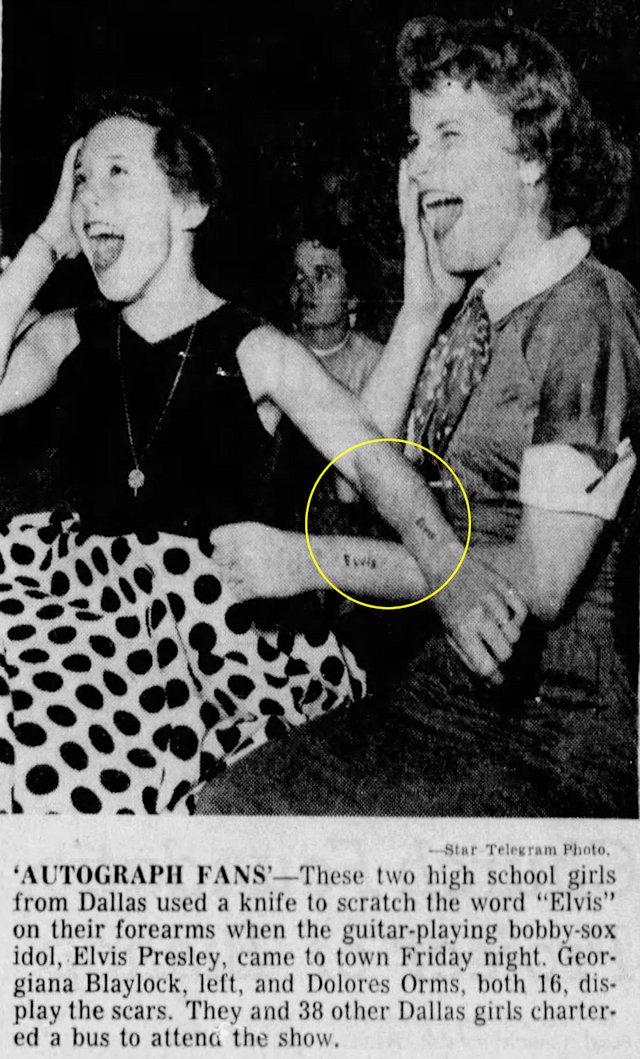 Two Elvis fans—remember: fans is short for fanatics—from Dallas, who chartered a bus with thirty-eight other girls, used knives to scratch the word Elvis into their arms.
Two Elvis fans—remember: fans is short for fanatics—from Dallas, who chartered a bus with thirty-eight other girls, used knives to scratch the word Elvis into their arms.
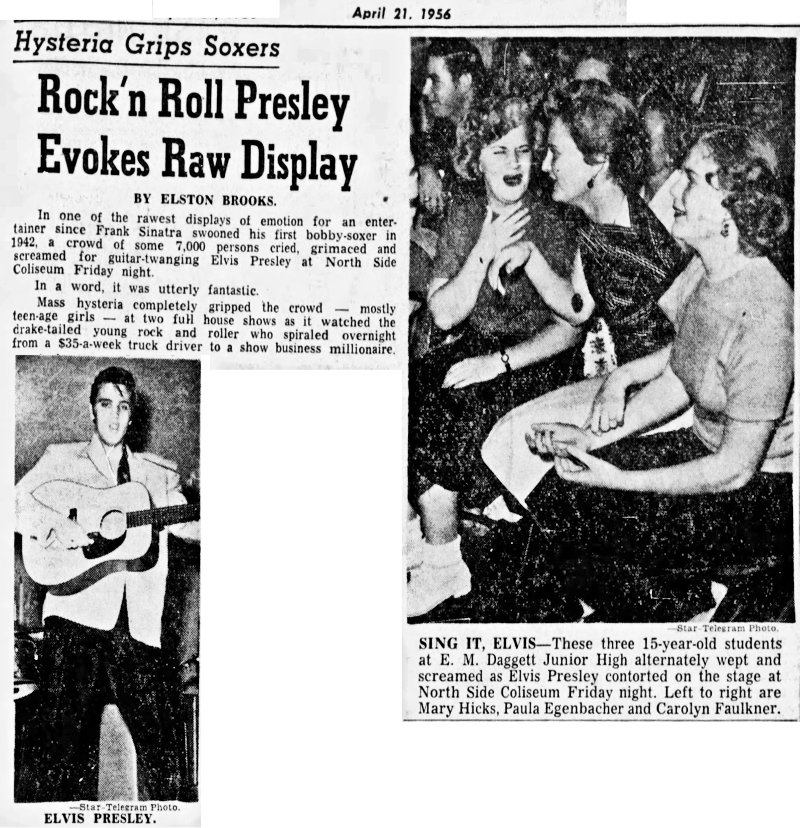 Here is Elston’s review in his column:
Here is Elston’s review in his column:
“In one of the rawest displays of emotion for an entertainer since Frank Sinatra swooned his first bobby-soxer in 1942 a crowd of some 7,000 persons cried, grimaced, and screamed for guitar-twanging Elvis Presley at North Side Coliseum Friday night.
“In a word, it was utterly fantastic.
“Mass hysteria completely gripped the crowd—mostly teenage girls—at two full house shows as it watched the drake-tailed young rock and roller who spiraled overnight from a $35-a-week truck driver to a show business millionaire.
“And all at 21.
“The audience patiently sat through a pre-Presley offering by various western artists, but by intermission one actually could feel the tension rising in the throng.
“An animalistic roar split the coliseum as Presley sauntered on stage at last, guitar around his neck.
“A cannon going off wouldn’t have been heard when the shrieks rose as Presley pitched into his first number, ‘Let’s Play House.’
“‘Elvis, I’m going to die!’ one girl shouted in ecstasy. She didn’t.
“‘Elvis, I’m going to faint!’ another threatened with closed eyes and clenched fists. She almost did.
“Presley closed his eyes and began the sensual, almost vulgar swaying of his body that has made him a nationwide celebrity.
“In a reaction better explained by Freud than Variety or Billboard, the girls collapsed on one another, moaning from side to side with closed eyes.
“They screamed. Tears ran down their faces. They swarmed toward the stage.
“Twenty policemen, imported for the Friday night show, shook their heads in amazement and ushered them back to their seats.
“Presley moaned and swayed through ‘Heartbreak Hotel,’ ‘Blue Suede Shoes,’ ‘Long Tall Sally,’ ‘Only You,’ ‘I Was the One, Honey,’ and ‘I’ve Got a Woman.’”
Elston then reflected on his interview with Presley:
“We wish to get one thing on the record this morning. Regardless of his act on the stage, Presley isn’t the Marlon Brando-James Dean type some have reported him to be.
“He’s a polite, well-mannered young man who says ‘sir’ to every question asked and who is tremendously humble at his fabulous success.
“He doesn’t wear motorcycle boots and black denim trousers. Instead, he was expensively attired in a lavender sports coat, black dress pants, a flashy sports shirt, and black loafers.
“He wears his sideburns long and there’s a bit of a duck-tail to his hair, but apparently the kids like it that way.
“Today he’s the hottest new item in show business. His recordings of ‘Heartbreak Hotel’ and ‘Blue Suede Shoes’ are writing their own tickets on the Hit Parade. Next week he opens in Las Vegas at $20,000 for 14 days. He’s just signed a seven-year contract with Paramount Pictures.
“His tour manager estimates this year he’ll clear $500,000.
“‘Two years ago,’ Presley said in a backstage interview, ‘I was making $35 a week driving a truck in Memphis. Man, this is the greatest thing that ever happened to me. It’s a dream come true.’
“He says he’s always ‘sung this way’ since he first picked up a guitar at the age of 12. His break came two years ago when a company decided to press a record of his after hearing a home recording.
“Presley, who doesn’t smoke or drink, says he does like to ride a motorcycle. And he has three Cadillacs. He drove one of them to the coliseum Friday night from the Westbrook Hotel where he was staying.
“‘It ran out of gas on North Main and I had to walk for some,’ he laughed. ‘Almost missed the show.’”
Here’s another measure of how quickly Elvis Presley’s star rose in the entertainment firmament: The website Newspapers.com returns only three search results nationwide for the phrase “Elvis Presley” in 1954 (all three in Shreveport). In 1955, 284 hits. In 1956, 42,005 hits!
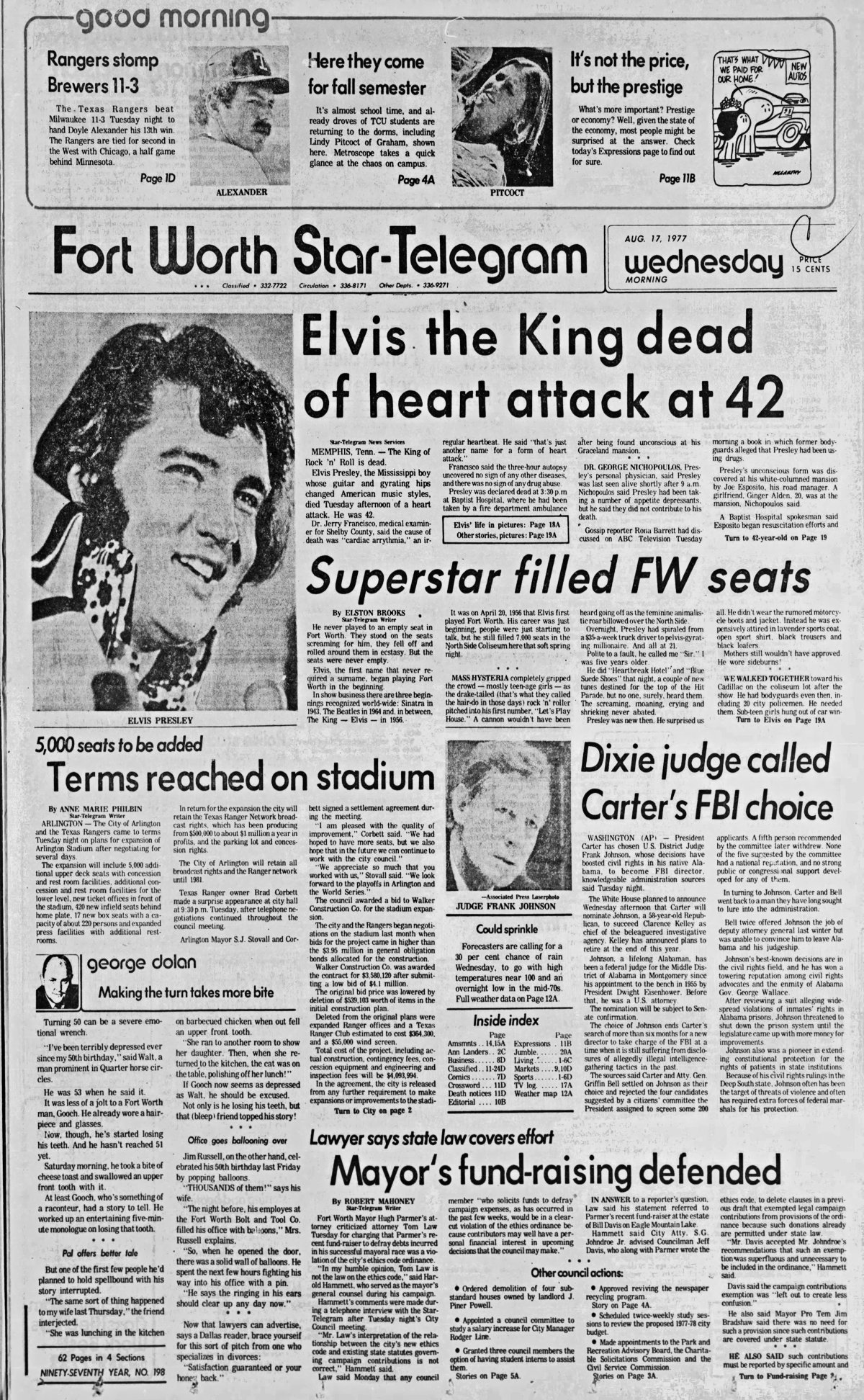 Twenty-two years after Elvis Presley’s first appearance in Fort Worth, his star flamed out.
Twenty-two years after Elvis Presley’s first appearance in Fort Worth, his star flamed out.
